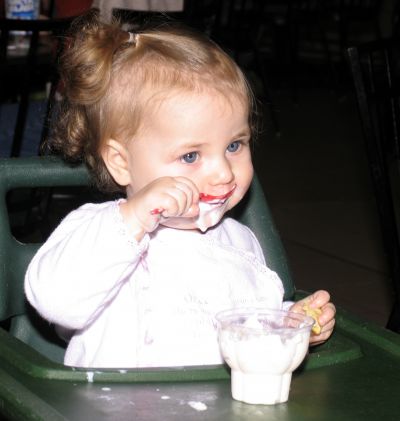Your baby has just turned one…they are definitely growing up fast and it’s time to give a variety of different foods to your little one. From now on, the foods you give your baby during breakfast, lunch and dinner will begin to replace milk as the main source of nourishment. At this stage milk will only provide half the calories and nourishment needed for your growing baby.
Eating Habits
You can begin to encourage your one year old, to eat and enjoy healthy meals with the rest of the family. There is no need to prepare two different meals anymore…all you may have to do is modify the texture of the food you are eating, such as serve small pasta pieces, cut up meats and veggies into small pieces. This makes it easier for your child to pick up.
Establishing A Well - Balanced Diet
Knowing exactly how much food your baby eats, varies from each individual child. Each day is different, one day your baby may be enjoying the foods you provide and the next not want to eat anything at all. Don’t worry…typically this is caused by growth and activity levels. Your baby should be responsible for how much they eat but you are responsible for what your baby is offered.
As you begin to increase the foods in your child’s diet, make sure you give your child enough foods containing calcium, iron and vitamins. Try to avoid giving your baby foods that contain added salt and sugar. For your baby, a well-balanced diet should include the following:
Breads and Cereals: 3 – 5 servings per day.
1 serving =
- 1 slice of bread,
- 1/2 cup cereal, or
- 1/2 cup cooked rice, pasta, noodles.
Vegetables and Legumes: 3 - 5 servings per day.
1 serving =
- ¼ cup of cooked or raw vegetables.
Fruit: 1 - 2 servings per day. .
1 serving =
- one piece – (Small apple, banana, pear, stone fruit etc).
Milk, Yoghurt and Cheese: 3 servings per day.
1 serving =
- 1 cup or 250 ml of milk, custard or
- 200g tub yoghurt or
- 30g cheese or cheese slice.
Meat, Fish, Poultry, Eggs, Nuts, Legumes: 2 servings per day.
1 serving =
- 1/2 cup meat or
- 1/2 cup kidney beans or other legume.
As you begin to increase the amount of solid food within your baby’s diet, encourage your baby to taste a wide variety of foods. Fresh fruits and vegetables are best for your baby however frozen, dried (fruit) or canned are simple alternatives. You can start to introduce full cream milk (instead of formula). If you would like, you can continue breastfeeding on demand for as long as you and your baby would like.
Foods to Introduce At 12 Months
By now your baby is probably used to mostly pureed fruits and vegetables. There are a variety of foods you can begin to introduce to your baby, now that they begin to develop their own eating habits. Remember to always supervise your baby while they're eating, in case of choking. Here are is list of foods you can introduce to your 1 year old baby:
- Mashed portions of the family meal (no sugar or salt should be added).
- Raw fruit and vegetable finger foods.
- Well–cooked whole egg, mashed or finely chopped.
- Fresh fruit juice (dilute 1 part juice with 10 parts water).
- Tiny portions of oil fish (salmon – make sure all bones are removed).
- Canned tuna in water.
- Fresh or canned tomatoes.
- Tiny amounts of un-smoked ham.
- Small amounts of hard cheese (cheddar).
While introducing new foods to your baby, their stools are likely to change colour. However, if your baby develops diarrhoea, vomiting, wheezing or a skin rash, your baby may be having an allergic reaction. Stop the food and call your doctor immediately.
Feeding Tips
As your baby begins to develop their independence there will be certain times where feeding your baby may be a bit of a struggle. There are a variety of reasons on why your baby could be refusing food such as the taste is not good, food is too hot, the portion is too large, the cutlery is the wrong size or the food is out of comfortable reach. Here are some practical tips for feeding your baby:
Take Your Time – When you begin introducing different foods to your baby, give your baby a few days getting use to it, before trying another one. This way you know the food isn't causing digestive or allergy problems.
Monitor Reactions – Watch out for signs of an allergic reaction. This may include skin rash, vomiting, wheezing and diarrhoea.
Don’t overfeed – When your baby has had enough then don’t force them to finish “all” of it. Your baby knows how much food to eat. Signs to watch out for include turning their head, pursing their lips or crying.
Limit sugary juices – It’s best to limit the amount of sweet juices (such as apple) you serve your baby, unless you water it down first. Most juices only contain sugar and vitamin C. If your baby drinks too much juice they may have fewer healthier foods which are necessary for growth.
Avoid Additives – Don’t add salt, sugar or other additives to your baby’s food.
Small Serves – Instead of encouraging your baby to eat large meals, allow them to snack throughout the day. Your baby can sit and join you during family meal times but don’t expect them to eat a lot at one sitting.
Encourage Self Feeding – Your baby will become interested in feeding themselves. Encourage self-feeding so your baby can learn to manage food and utensils by themselves. It’s great for developing fine motor skills and independence.
Make it Fun – The most important thing is to make feeding an enjoyable experience. There is no need to shovel food into your baby’s mouth. Use games (such as airplane or choo choo). Be patient and gentle when feeding your baby so they can enjoy the experience.
It’s important to provide your baby with a wide variety of healthy foods. They will begin to develop their own tastes for foods and establish healthy eating habits. Talk cheerfully with your baby, play games and make meal time enjoyable and don’t punish your child for not eating. Overall your baby is growing into an independent little eater.










